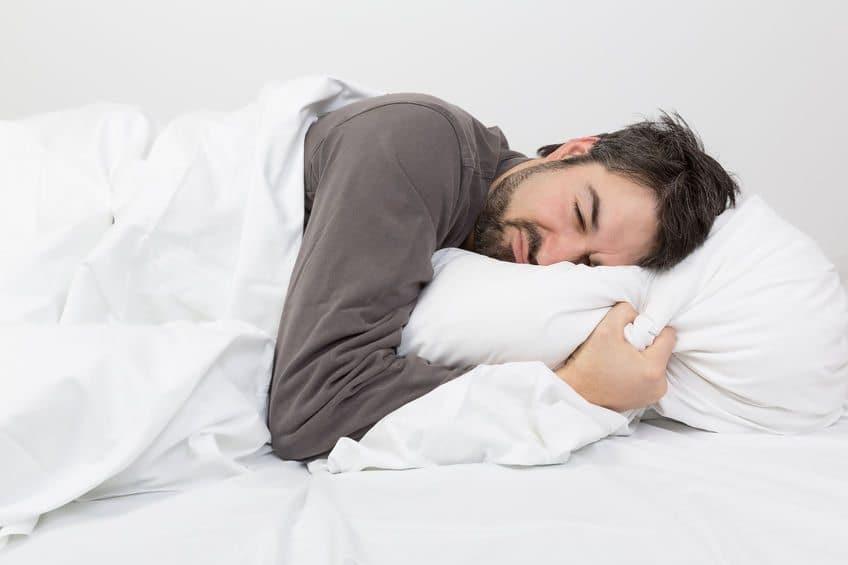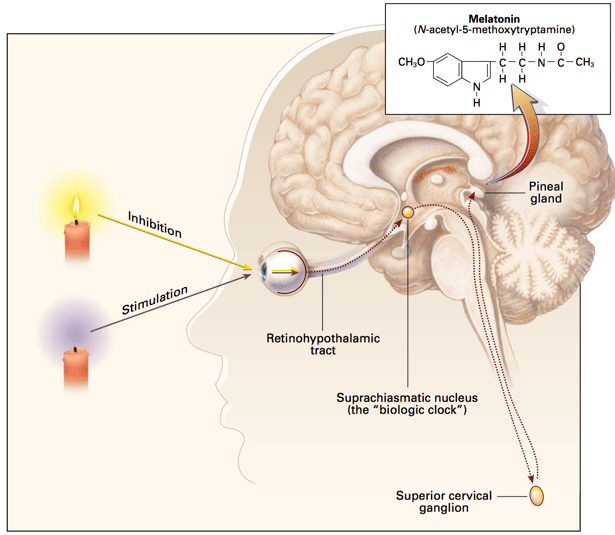
A lot of people take melatonin these days.
They take it to get to sleep.
They take it to stay asleep.
Some people take melatonin only occasionally, such as when they travel.
It is supposed to help you readjust your circadian rhythms.
When you travel between time zones, your body doesn’t know what time it is.
Imagine traveling from New York City to Paris.
It’s a five hour time difference between these two cities.
So when it’s 9 o’clock at night in Paris, it’s only 4 o’clock at night in New York City.
If you normally live in New York City, your body has no way of knowing that it’s 9 PM where you are in Paris.
We call this jet lag.
Your body calls it a sleep disruption because you’re trying to sleep when your body thinks it’s daytime.
So when you’re in Paris, and you pop a melatonin tablet, you are trying to teach your body what time it is where you are.
Melatonin is the hormone that builds up in your system to cause you to feel tired and go to sleep.
Taking melatonin by tablet actually does work to help you sleep to some degree.
I’ve taken it with some success, but I’ll tell you now that I am not going to take it anymore.
Melatonin’s activities in the human body are very complicated.
We know it helps us with sleep, but it also seems to affect other systems.
Melatonin affects male reproduction, and not in a good way.
You may (or you may not) know that melatonin is produced in a tiny gland in the brain called the pineal gland.
It’s also the location of what many cultures mysteriously call the “third eye.”
They believe this because there’s some evidence that the pineal gland is photosensitive.
And there’s a really good reason why this gland is light sensitive.

When it’s dark out, you’re supposed to be sleepy.
This is a coping mechanism that we’ve developed to deal with darkness.
As the pineal gland registers the light going away, it starts to produce more melatonin.
It’s been established for a long time that darkness creates stress in the body.
The body loves the light and hates darkness.
But we’ve evolved a lot of adaptations to handle the darkness.
We had to evolve because we’ve been in the darkness and night as a normal part of life for billions of years.
So what melatonin does is it fires up the stress hormone machinery in the human body.
It lowers thyroid because our body thinks that we don’t need thyroid when were sleeping.
Melatonin also raises estrogen levels.
Estrogen is a stress hormone itself, especially in men.
Higher estrogen temporarily helps the body handle stress.
In the short run higher estrogen is one of the defense mechanisms that our body uses.
But in the long run, the higher estrogen is very bad.
Cells bathed in estrogen will absorb more water, and reproduce faster.
While the estrogen protects the cells in the short term, long term exposure can lead these cells to become cancerous.
Now let’s turn to the effects of melatonin on male reproduction and sexual performance.
 Yes, it’s a hamster study.
Yes, it’s a hamster study.
We’ll look at a human study in a moment.
But there’s something very important to be learned here before we move on to the human male study.
In animals maintained on short days (light 6 hours, dark 18 hours), small amounts of melatonin prevented testicular regression.
But hamsters receiving a larger amount of melatonin, or melatonin during daylight, experienced testicle regression.
Testicular regression is exactly what it sounds like.
It’s when testicular tissue is damaged to the point of actually disappearing.
This is a common theme with melatonin.
If you take melatonin during the day, it may damage your reproductive system.
If you take melatonin at night, you’re better off.
But if your dose is too high, you’re going to experience reproductive damage.
Our theory is that this is how melatonin affects the thyroid.
But there’s also a key point here which is that melatonin suppresses progesterone.
Progesterone is the natural antagonist to estrogen.
Even in men.
Remember that men who are around 50 years old or higher will often have higher estrogen levels than their wives do.
Men need progesterone as well.
With melatonin suppressing progesterone, there’s not enough progesterone to keep estrogen in check.
This means that men are more likely to become estrogen dominant.
You would expect men who have too much melatonin to have some feminizing going on.
You’d be right.
Men who have too much melatonin can suffer from gynecomastia (man boobs).
These men will also cope with poor sperm motility, and poor sexual performance.
This new study shows the type of damage that melatonin causes.
Excess melatonin damages the male reproductive system and destroys sexual performance.
 This was a small study, but it was carefully done in Israel.
This was a small study, but it was carefully done in Israel.
They found that for many of the men who took daily melatonin, they observed
a decrease in sperm concentration and motility below the normal range.
They also observed a possible increase in prostate size for men taking melatonin.
The increased size was caused by the increase in estrogen.
And an earlier study found
a case of painful gynecomastia and altered serum androgen:estrogen ratios in a man who had been taking melatonin for several years. On stopping melatonin, symptoms resolved spontaneously.
It all begins to become clear.
Our body is supposed to use melatonin during the night.
This is a reaction to the stressful situation of darkness.
Melatonin is supposed to suppress a lot of our metabolism.
It supposed to let us rest.
Melatonin is supposed to increase our estrogen temporarily and help protect us in some ways as we hibernate at night.
Melatonin should not be taken except in exceptional circumstances.
Because over time melatonin will raise estrogen levels, and contribute to testicle damage.
Citations
Melatonin in Humans
http://www.nejm.org/doi/pdf/10.1056/NEJM199701163360306
Melatonin: antigonadal and progonadal effects in male golden hamsters
http://science.sciencemag.org/content/190/4211/280
Melatonin Administration Alters Semen Quality in Healthy Men
https://www.researchgate.net/profile/Peretz_Lavie/publication/11309998_Melatonin_administration_alters_semen_quality_in_healthy_men/links/541812070cf203f155ad92c0.pdf
Click for more information on Melatonin, for information on Natural remedies, or for more on how Melatonin effects in Humans.
